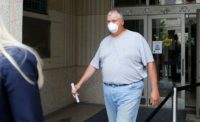Former Illinois State Senator Martin Sandoval (D) has pleaded guilty to charges of bribery and filing false tax returns and is now cooperating with federal prosecutors in an ongoing corruption investigation that involves construction companies and the use of recycled material in highway pavement projects.
In Sandoval's Jan. 28 plea agreement in federal court in Chicago, the one-time chairman of the Illinois Senate's Transportation Committee admitted to taking more than $70,000 in bribes from a red-light camera company, identified in court as SafeSpeed, which operates red-light cameras in several Illinois municipalities. Sandoval admitted that in July 2018 he requested $5,000 per month from an unidentified cooperating witness. He also admitted taking $180,000 in bribes from five other unidentified individuals or entities.
Last fall the FBI searched Sandoval's office and among many other things sought items relating to Bluff City Materials Inc., which is owned by a long-time Sandoval campaign contributor, according to a publicly released search warrant.
The payments were supposed to be a "consulting fee" equal to a percentage of the revenue generated from cameras that Sandoval helped place in Oak Brook Terrace, Ill., a municipality in Chicago's western suburbs.
The red light camera investigation and plea has brought attention to a controversial use of recycled material in highway pavement.
Last year the FBI searched Sandoval's office and among many other things sought items relating to Bluff City Materials Inc., which is owned by a long-time Sandoval campaign contributor, according to a publicly released search warrant. The contributor and Sandoval had both pushed for regulations allowing and favoring recycled asphalt shingles as a building material in highway and road projects.
The political pressure applied to both approve the use of recycled asphalt shingles in road projects and require shingle recycling by demolition contractors for use on road projects is being questioned in light of premature road surface cracking on some projects. A federal agency subsequently revised rules for the material's use after the cracking was observed in many states beyond the Midwest.
The investigation and federal probe involving Sandoval's influence and SafeSpeed has already led to the resignation of Oak Brook Terrace, Ill., Mayor Tony Ragucci on Jan. 20.
The Illinois Dept. of Transportation was responsible for approving installation and operation of red-light cameras statewide. In the plea agreement, Sandoval admitted to pressuring the agency to allow the Oak Brook Terrace cameras.
Prosecutors made public texts of recordings of Sandoval. "It's hard for me to swallow how [people] make so much off of you, right? And I gotta do all the work," Sandoval is heard saying during a July 2018 meeting with the cooperating witness.
'Protector fee'
Sandoval added, "I think the protector aspect, it never changes. If there's a...bill or something like that, if you set a fee, a protector fee, unless there's something really [expletive] extraordinary."
In addition to asking for a "protector fee," Sandoval discussed on tape how the witness would pay him $5,000 monthly. It included asking, "Do you have a bologna company, or something innocuous?" according to the plea agreement.
In August 2018, Sandoval accepted $15,000 in cash that he believed constituted three of the protection payments from the cooperating witness. Overall, he took $70,000 from what he believed was SafeSpeed as its "protector."
In addition, Sandoval accepted another $180,000 in what the plea agreement said are bribes involving alleged criminal activity with five participants. He also pleaded guilty to evading paying taxes on his income from the bribery.
Sandoval also agreed to cooperate with an ongoing federal probe into alleged corruption in Illinois government that has produced the indictment of Aldermen Ed Burke (D) and has touched other state elected officials.
John Lausch, U.S. Attorney for the Northern District of Illinois, did not provide details about what information Sandoval, the former senator, has agreed to share. But Lausch did say, "He's agreed to testify on any matter we ask him to testify about," as part of the plea agreement.
Asphalt Investigation
Another contributor the scandal has put in the spotlight is shingle recycling magnate Michael Vondra, who owns Bluff City Materials and Southwind RAS, both based in Bartlett, Ill.
The FBI raided the Bluff City Materials office in Bartlett last September. According to an unconfirmed report in the Chicago Tribune, Vondra and his companies had help from Sandoval in getting use of its recycled asphalt shingles approved and mandated for use in IDOT projects.
RAS Is an industry acronym for reclaimed asphalt shingles. Sandoval collected more than $50,000 in political contributions from firms tied to Vondra since 2010, the same year his recycler, Southwind RAS, was created. It is one of several construction and recycling companies Vondra already owned.
Illinois roads have, for decades, been resurfaced with a mix that includes new asphalt and ground-up old pavement. But in 2010, IDOT decided to allow recycled roof shingles into the asphalt mix.
In 2011, the state legislature passed a bill telling IDOT to “maximize the percentage of recycled asphalt roofing shingles” used in pavement mixes, while maintaining quality. A signing ceremony was held at the Southwind RAS office.
In 2013, IDOT contractors bought more than 12 times as many shingle grounds as they had in 2011 — the vast majority in metro Chicago and supplied by Vondra’s company, Southwind RAS, state records show.
Recycled-shingles legislation
As Southwind RAS expanded and opened more shingle-recycling plants, Sandoval was a sponsor of a 2013 measure, Senate bill 2226, that helped stock them. After SB2226 became law in January 2014, it forbade dumping shingles in any landfill within 25 miles of a shingle-recycling facility.
In 2013, another law was passed to tighten rules on who could operate a shingle-recycling facility. Sandoval sent IDOT a proposal on how to enforce the law, which Vondra endorsed in a follow-up note to a top agency official, according to the Chicago Tribune. Some of the projects that employed RAS were sections of Interstate 88, Interstate 90, Interstate 355, Interstate 294. Another, at O'Hare International Airport, used the material as a base layer under concrete for runways, taxiways and other roads.
The Federal Aviation Administration said the 9,500 tons of RAS used in the O'Hare work was the first in a U.S. airport when it was completed in 2014.
An IDOT spokesman said Vondra and representatives of his companies had met with officials from the agency several times over the last decade and that they regularly communicated with it over regulatory issues related to RAS. But the spokesman added that Vondra did not influence IDOT's policy in any way. He declined to comment further on the issue.
“Mr. Vondra expressed a desire for less-stringent standards," the IDOT spokesman said. "None of those meetings or any other communication, however, resulted in any shift with IDOT’s underlying policy” on the use of recycled asphalt shingles, he added.
Indeed, in 2014, Illinois' apparent preference for recycled asphalt shingles as a building material for roads began to end. IDOT and federal officials began to investigate early cracking in new pavement projects that had used RAS.
IDOT issued a memo that year that said “caution needs to be used” with recycled asphalt shingles in road construction. The Federal Highway Administration issued a nationwide alert, saying it had noticed problems in other states as well.
FHWA ultimately threatened to withhold funding for Illinois projects if IDOT didn't ease up on the recycled material's use or test it more effectively.
Federal highway officials organized a national panel in 2016 to review the material’s use including a survey of state DOTs and contractors using it and concluded that if it were to be mixed in, it should be used within limits.
Vondra, through a trade group headquartered at one of his offices, mounted a response that included sponsoring a study by a University of Illinois professor that said RAS could still be used effectively and was not responsible for the premature cracking. The study found that high traffic and cold temperatures that caused the cracking.
Four U.S. House members from Illinois — Chicago area representatives Dan Lipinski (D), and Mike Quigley (D), Cheri Bustos (D), who represents the area near Moline, Ill., and the quad cities area and Rodney Davis (R) who represents a downstate district — criticized the federal crackdown on recycled asphalt shingles in road projects. In a letter, they warned that the Illinois FHWA office's actions could hinder "the expansion of proven green technologies in the transportation industry."
Vondra's companies, such as Bluff City Materials and Southwind RAS, made political donations to Sandoval's reelection campaigns according to records from the Illinois State Board of Elections. According to an FBI search warrant for a search of Sandoval's office in October 2019, agents were looking for documents and correspondence with several highway companies owned by Vondra.
Even as IDOT was tightening the rules on use of recycled shingle material in roads, Sandoval, in October 2014, wrote to the agency's acting secretary and accused the department of “failing to use its best efforts” to follow the 2011 state law that boosted RAS usage in road projects.
Neither Southwind RAS nor Vondra has been charged with any crime. A representative of Southwind RAS sent a timeline of events with a statement that said 'use of RAS has reduced Illinois carbon footprint, saved taxpayer dollars and saved millions of cubic yds of waste landfill space.'
“Your department’s actions…will result in a loss of jobs and waste millions of dollars invested by the industries that have answered our call for greater sustainability in road construction,” Sandoval wrote.
In the final days of the administration of then-Governor Pat Quinn (D), Sandoval threatened to hold hearings and file an ethics complaint after telling the secretary he’d lost “trust and confidence in your leadership." The Chicago Tribune obtained the letter via a Freedom of Information Act request.
Neither Southwind RAS nor Vondra has been charged with any crime or specific allegation of wrongdoing. Nor is it clear that the FBI search seeking items related to Southwind and Vondra will lead to any charge.
In response to a request for comment, a representative of Southwind RAS sent a timeline of events with a statement that said "use of RAS has reduced Illinois carbon footprint, saved taxpayer dollars and saved millions of cubic yds of waste landfill space."
A spokeswoman for Southwind RAS pointed to the 2014 University of Illinois study that placed blame for the road cracking on other factors than the use of RAS. In a statement, she said that "the premature cracking reported in 2014 was not due to the use of higher percentages of recycled asphalt in 2012-2013 road projects but because of movement of the underlying concrete base due to higher traffic loads and extreme cold temperatures."
The FHWA's final technical brief on the subject, published in 2018, had a different take on the subject. The brief said that "there is no widely accepted method to determine the blending of new and reclaimed binder [in asphalt]."
"The amount of blending among RAP [reclaimed asphalt pavement] and virgin binders is often assumed to be 100%," the technical brief said. 'But for RAS mixtures, it is assumed that only partial blending occurs. To maintain similar or better performance, the virgin binder content of the mixture may need to be increased to account for this lack of blending and ensure mixture durability."
The technical brief found, however, that, "when properly engineered, produced, and constructed," RAS materials "can provide comparable levels of service as asphalt mixtures with no reclaimed materials, referred to as virgin asphalt mixtures," while noting that "care must be taken during design, production, and construction to ensure proper performance."
An attorney for Sandoval said he would have no further comment beyond he admitted in his plea agreement at his hearing.





Post a comment to this article
Report Abusive Comment